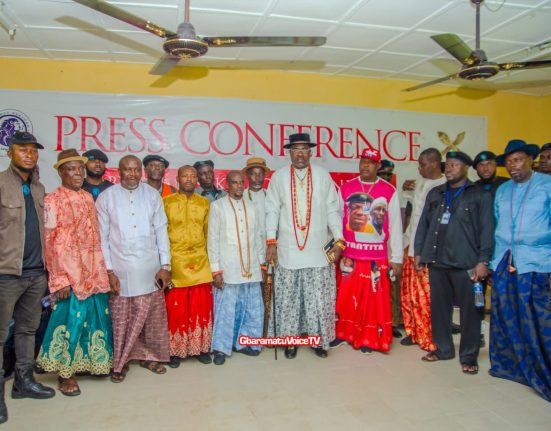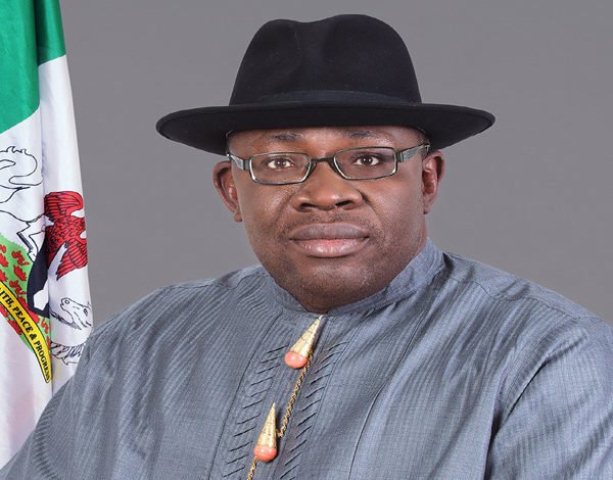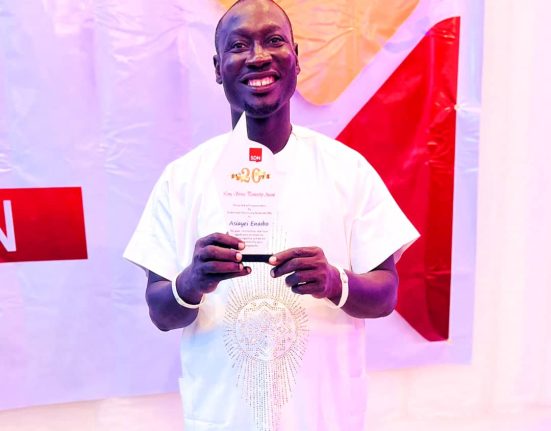BEING THE ADDRESS DELIVERED BY THE APOI-IJAW PEOPLE AT A PRESS CONFERENCE IN THE PALACE OF THE KALASUWE AND PARAMOUNT RULER OF IJAW-APOI LAND IN SABOMI, ESE-ODO LOCAL GOVERNMENT AREA OF ONDO STATE THIS I5TH DAY OF DECEMBER 2017
INTRODUCTION
Her Royal Majesty, The Regent Kalasuwe of Ijaw-Apoiland, other traditional rulers in the confederation of the Ijaw-Apoi and other Ijaw kingdoms here present, chiefs, other distinguished personalities here present, gentlemen of the press, distinguished ladies and gentlemen.
We are here gathered at the instance of the Ijaw-Apoi Traditional Council under the paramountcy of the Kalasuwe, Oba of the Ijaw confederation and other traditional rulers, representing the good people of the Ijaw-Apoi confederation.
The attention of the Ijaw-Apoi nation has been drawn to the current disturbing imbroglio between the Bini kingdom and its monarchy and the Okomu-Apoi kingdom and other Ijaw kingdoms in the Ovia South West Local Government Area of Edo State. The crisis is not only on the age long marginalization of the Ijaws in Edo State generally, but the continued brazen denial of the Ijaw people their inalienable rights to rule themselves, on the basis of the false and unfounded history by the Bini people, tending to abominably subject the autochthonous Ijaws of Edo State to the traditional authority of the Oba of Benin.
Our intervention herein is to set the records straight in confirmation of the autochthonous status of Okomu kingdom, being an integral part of the Ijaw-Apoi and the aboriginal riverine Ijaw ethnic nationality.
OKOMU AS PART OF THE AUTOCHTHONOUS IJAW-APOI PEOPLE AND TERRITORY:
Okomu-Apoi people, now in Edo state, are part of the autochthonous territory of the Apoi, whose origin predated human memory and recorded history. The Apoi, from which most Ijaw clans took root, were the aboriginal occupiers and owners of a vast territory spreading from the ancient Apoi creek of the Southern Ijaw in today’s Bayelsa state and westwards through Delta, Edo, to the Ese Odo Local Government Area of Ondo state.
From ancient times, the Ijaw-Apoi nation is politically organized in a confederation of nine principal kingdoms with the Kalasuwe of Ijaw-Apoi now in the Ese Odo Local Government Area of Ondo state, as the revered Paramount ruler. These nine principal ancient kingdoms are Okomu; Kiribo/Ipoke; Igbekebo; Ojuala; Igbotu; Inikorogha; Oboro; Sabomi and Igbobini.
IJAWS AND THE NIGER DELTA
The aboriginal status of the Ijaws in the coastal belt of Nigeria, spanning the present 6 states of Akwa Ibom, Rivers, Bayelsa, Delta, Edo and Ondo states, is now beyond controversy. While we acknowledge the presence of other tribes therein over times, it is historically preposterous to suggest that the Ijaws, in their autochthonous territory, are subject to the traditional authority of any other tribe in the Niger Delta.
At the beginning of Afro-European relationships in the 15th century, the Ijaws exclusively controlled the oil trade along the coast. The prime position of the Ijaw in the coastal region is further attested by the fact that in the three centuries of trans-Atlantic slave trade, the Ijaws, acted as middle men or transport agents between the Europeans and the hinterland African tribes but, were never themselves sold into slavery. Ijaws are so autonomous, independent and even fiercely republican, that they are never slaves to any tribe, not even among themselves. This is so acknowledged in the Yoruba adage that ‘Ijaw kii se eru Ijaw’ (Ijaw is no slave to his fellow Ijaw).
IJAW-APOILAND AND CHRISTIANITY IN NIGERIA
In chronological order, European missionary activities came on the heels of the slave trade. After the introduction of Christianity by Methodist Birch Freeman in Badagry and Lagos in 1842, Apoiland at Igbobini, before the turn of the century, was the next port of call for the Methodist mission. Thus, the Igbobini Archdiocese of the Methodist Church covers the present Ondo, Delta and Edo states. The Anglican Church later came through the riverine area of the present Ondo state in 1875 spreading from the Apoi religion to the present Delta, Edo and other states eastwards.
IJAW-APOILAND AND THE BEGINNING OF BRITISH COLONIAL RULE
At the outset of British colonial rules, most of the established African empires were declared Native Authorities, in pursuance of the British Indirect Rule policy. In addition, detailed inquiries were conducted on the history and cultures of such indigenous people and Intelligence Reports issued subsequently.
At the amalgamation of the Northern and Southern Protectorates in 1914, Oba Jubo, the Kalasuwe of Ijaw-Apoiland was one of the earliest traditional rulers visited by the Governor Lord Lugard. In 1917, the Kalasuwe of Apoi was confirmed by Memo of the Acting Secretary Southern Provinces to the Resident No. A 582/1917 of 11th April 1917, declared Native Authority and later Gazetted as Oba of Ijaws in the territory of the Ijaw Confederation during the reign of Kalasuwe Jubo. This was in recognition of the ancient confederal political arrangements of the Ijaw-Apoi with its 9 autonomous kingdoms under the paramountcy of the Kalasuwe.
An Intelligence Report of the Apoi-Ijaw Area of Okitipupa Division, Ondo Province written by E. A. Lewis Cadet, Assistant District Officer, Okitipupa Division, dated 27th of February 1940.
APOILAND AND THE ADMINISTRATION OF ONDO PROVINCE (1915)
Administrative Capital: The capital of Ondo Province (now Ondo and Ekiti states) was originally at Igbobini in the Ijaw-Apoi confederation where the colonial resident was based in 1915. The capital was later shifted to Ondo and later Akure.
Okitipupa Federal Native Authority: Igbekebo of the Ijaw-Apoi confederation was the administrative headquarters of the Okitipupa Native Authority Administration when created in 1928.
Judiciary: Igbekebo town in the Ijaw-Apoi confederation was also the Ondo Provincial Court Headquarters. Among the landmark cases held in Igbekebo was the 1917 territorial suit between the Oba of Ijaws (Kasasuwe Jubo) against Oba Igbakenrun Omowole, the Amapetu of Mahin (Illaje Yoruba) over the ownership of Igbokoda the present headquarter of Illaje Local Government and other villages such as Kofawe, Kurugbene up to the confluence of the Ofara and Italita River and Ibila. The case which was presided over on the 19th December 1917 by R. D. N. Raikes, Colonial resident at Igbekebo was the root of several other cases up to the Supreme Court in Suit No. 173/90 now reported as Bunyan v. Akingboye (1999) 7 NWLR 31-42 SC.
In the same vein, the Judicial Inquiry into the dispute between the two leading Illaje traditional rulers, Amapetu of Mahin and Mafimisebi the Olugbo of Ugbo was held at Igbekebo in June 1921. This was attested to in paragraph 49 page 14 of the Illaje Intelligence Report.
APOI AND NEIGHBOURING YORUBA COMMUNITIES
It may be noted that centuries of cultural interference of the neighbouring Yoruba communities, especially the Ikale, Illaje and Ondo, has affected the Ijaw-Apoi language, such that our language today is essentially a dialectical variant of the Yoruba language and the reason our traditional rulers are called Obas unlike other Ijaws.This is not also different from the experience of the Bini which also adopts the title of Oba on account of the Yoruba origin of her monarchy.
KALASUWE, OBA OF IJAWS AS INDEPENDENT NATIVE AUTHORITY
By the Nigerian Gazette No 32 Vol 11 of 26th June 1924, made under the Native Authority Ordinance, “the list of Native Authorities appointed by the Governor under Section 4 of the Native Authority Ordinance which are not subordinate to other Native Authorities” was published. The said Government Notice included the Oba of Benin in the Benin Province and the Kalasuwe as Oba of Ijaws in the territory of the Ijaw Confederation as “Native Authorities which are not subordinate to other Native Authorities”.
In other words, the Kalasuwe and all the kingdoms subject to its authority or owe traditional allegiance to it, including the constituent Okomu kingdom are not subordinate to any other Native Authority including the Bini kingdom and her Oba.
RIVERS ARE NOT BOUNDARIES OF THE IJAWS
It cannot be over emphasized that, being indigenous to the riverine environment, the Ijaw territory is not defined by creeks, rivers, lagoons which constitute our natural habitat. Thus, such colonial nebulous geographical descriptions, using rivers as defining territorial landmarks, as contained in the Provincial Boundaries of Government Notice No 99 of 23rd December 1915, are merely for administrative conveniences and do not delimit the traditional territorial space of the Ijaw traditional kingdoms. Thus Okomu remains part and parcel of the Apoiland, notwithstanding inclusion in a different state.
IJAW-APOI, YORUBA AND BENIN
Since the 1917 declaration of the Kalasuwe as a Native Authority, like other traditional rulers of like status, including the Oba of Benin, the Kalasuwe of Ijaw-Apoi continues to enjoy a First Class status in Ondo Province and State even as a predominantly Yoruba state. This is in realization of the true position of the independent and aboriginal status of the Ijaw in the territory occupied by them. The Bini cannot claim a different or older history than the rest of the Yoruba from where it originated. Thus, the hollow claim of Benin to a higher traditional status to any Ijaw clan in Edo state, particularly the ancient Okomu-Apoi kingdom, is merely megalomaniac and unbridled territorial ambition which will never stand.
The Bini must be reminded that Bini territories which are grouped in other states for administrative conveniences, are not discriminated against but accorded their right pride of place in traditional, administrative and infrastructural considerations. For instance, under the Western Region Local Government Law, 1952 which created the Ese Odo District Council of which the Kalasuwe of Ijaw-Apoi is the Chairman and most prominent traditional ruler, Akotogbo in the territory of the Bini Confederation enjoyed its rights and privileges to the fullest, notwithstanding its minority status therein. The Oba of Akotogbo, now in Irele Local Government of Ondo state, enjoys its appropriate grading. The Akotogbo electoral ward has its exclusive councilor representative, its children have been elected and served as Local Government Chairman, member of the Ondo State House of Assembly and House of Representatives and has its fair share of infrastructural development.
IJAWS IN ONDO EDO STATE:
EDO STATE SHOULD EMULATE ONDO STATE
In furtherance of its Native Authority’s status aforementioned, the Kalasuwe (Oba of Ijaws) is a GRADE A traditional ruler and permanent member of the Ondo state Council of Obas, while the other Obas in the Ijaw Apoi Confederation are not less than GRADE B. The Agadagba of Arogbo, the traditional ruler of the other Ijaw clan is also GRADE A and permanent member of the Ondo State Council of Obas and Chiefs.
The Ijaw ethnic nationality in Ondo state, compared to Edo, enjoys local political independence having a Local Government of our own; a permanent seat in the state House of Assembly; a permanent representative in the state Executive Council; permanent secretaries in the state civil service among other positions at the state level. Our children have several times represented the state in the House of Representatives of the National Assembly and have been appointed to the position of the Vice Chancellor of the state owned university, ambassador, High Court judge, Minister of the Federal Republic and presently the Deputy Governor and Governor of the state, among other top positions.
The Bini people and the Edo State Government need to take a cue from this civilized way of treating minorities. Our last visit to Okomu left a sour taste in the mouth in the crude marginalization of the ancient kingdom where there is not even a public primary school.
OUR RESOLVES:
- That we express solidarity with the people of Okomu-Apoi kingdom and other Ijaw clans in Edo state in their quests for inalienable political, administrative and traditional independence.
- We declare and confirm that the ancient Okomu-Apoi is an autochthonous kingdom, of immemorial existence as part of the Ijaw Niger Delta ethic nationality and not subject or subordinate to any other traditional authority including the Bini kingdom and its monarchy.
- That the Edo State Government should accord the traditional ruler of Okomu-Apoi its appropriate recognition in the First Class status, including other Ijaw Kingdoms, as it has done for the other traditional rulers among Bini, Ishan, Afenmai, Agbor and other ethnic groups in the state.
- That it is so inhuman that the Ijaw territory that produces the wealth of the state, particularly of its abundant oil palm and rubber plantations, extensive forest reserves and crude oil production, which serve as the mainstay of the state economy, could be so unconscionably marginalized in terms of infrastructural development. We therefore call on the Edo state government for urgent redress in the interest of humanity.
- We call on the Federal Government to urgently intervene in the brewing crisis between the Ijaws and Binis and urge that the Edo State Government do justice to all for the much cherished peace.
Long live the Ijaw-Apoi land!
Long live the Ijaw Nation!
Long live the Federal Republic of Nigeria!
Thank you all.
Presented By:
High Chief Femi Iji, The Barate of Igbobini and Former Chairman, Illaje Ese-Odo Local Government for and on behalf of the Ijaw-Apoi Traditional Council and People.
Support Quality Journalism in the Niger Delta Region
Join us in our mission to bring development journalism, cultural preservation, and environmental awareness to the forefront. Your contribution makes a difference in the lives of the people of the Niger Delta. Donate today and be a part of the change!









Leave feedback about this
You must be logged in to post a comment.